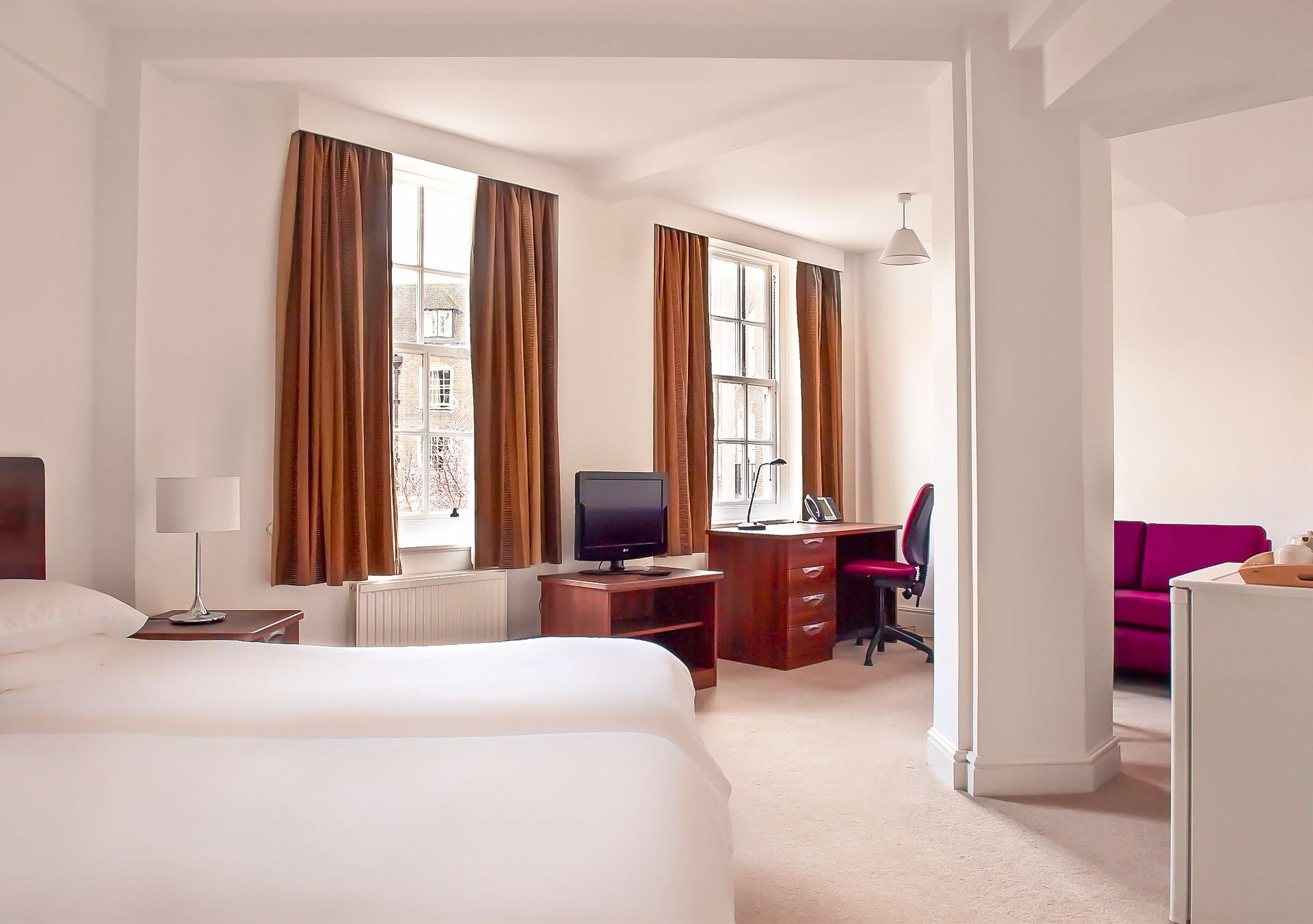Alors que Cambridge existait peut-être à l'époque romaine et est devenue un bourg normand (le nom de la ville a muté de Grentabrige ou Cantebrigge (Grantbridge), son université a fait ce qu'elle est aujourd'hui.
L'université a été créée en 1209 lorsqu'un groupe d'érudits d'Oxford s'est installé dans la ville pour échapper à la violence qui régnait à l'époque à Oxford. Mais même à cette époque, l'Université avait des problèmes de discipline (!). Les étudiants n'appartenaient à aucun corps particulier, n'étaient responsables envers personne et allaient et venaient de manière irrégulière. En 1231, les étudiants de Cambridge étaient en nombre suffisant et apparemment si indisciplinés qu'Henri III délivra un certain nombre d'ordonnances pour punir les désordonnés.
Ce sont les solutions à ces problèmes disciplinaires, imaginées par Hugh de Balsham, évêque d'Ely de 1257 à 1286, qui allaient semer les graines du système universitaire actuel. Il a placé les érudits (maintenant connus sous le nom de « savants de l'évêque d'Ely ») dans deux maisons à côté de l'église Saint-Pierre sur Trumpington Road. Ceci est devenu connu sous le nom de « La Maison de Saint-Pierre » et c'est ainsi que progressivement le système universitaire a commencé à évoluer et que Peterhouse, le premier collège de Cambridge, est né.
En 1318, l'Université fut officiellement baptisée par une bulle papale du pape Jean XXII. D'autres collèges suivirent peu après : le Trinity College (initialement appelé Michaelhouse) fut fondé en 1324 par le chancelier de l'Échiquier de l'époque, Hervey de Stanton, et le Clare College, initialement appelé University Hall, fut le suivant en 1326. Le Pembroke College fut fondé en 1347 par l'épouse du comte de Pembroke et l'année suivante, Edward Gonville fonda son propre collège connu sous le nom de Gonville Hall : celui-ci fut ensuite refondé par le Dr John Caius en 1557 pour nous donner Gonville et Caius.
La plupart des collèges ont été fondés par de riches individus issus de l'Église, du gouvernement ou de propriétaires fonciers. Le Corpus Christi , fondé en 1352, a la particularité d'être le seul collège issu directement des membres de la ville. Christopher Marlow, le célèbre contemporain de Shakespeare, était étudiant au collège et on peut encore voir ses appartements dans l'ancienne cour.
King's College fondé au XVe siècle : Henri VI voulait qu'il fasse partie d'une double fondation avec Eton et, ce faisant, il semble qu'il répétait le plan de Guillaume de Wykeham, qui avait fondé Winchester et le New College d'Oxford. Queens a été fondée par Marguerite d'Anjou, épouse d'Henri VI, et plus tard, l'épouse de William IV, Elizabeth Woodville, est devenue co-fondatrice (donc Queens plutôt que Queen's). Cela n'a pas été anormalement décrit comme le premier symbole extérieur de la réconciliation des maisons d'York et de Lancaster.
Le XVe siècle a également amené deux autres collèges : John Alcock, alors évêque d'Ely, a fondé Jesus en 1469 et Robert Wodelark, un prévôt du Kings College, a fondé St Catharine's en 1473.
Avec aujourd'hui 31 collèges, l'Université a progressivement grandi en taille, en stature et en influence sur le monde : ses diplômés ont atteint les plus hauts niveaux dans les sciences, l'Église, le gouvernement et les affaires à travers le monde.
Quelques anciens élèves et universitaires notables
15 Premiers ministres britanniques dont Robert Walpole, considéré comme le premier Premier ministre de Grande-Bretagne
Oliver Cromwell - Lord Protecteur d'Angleterre (1653-58) - Sidney Sussex
Sir Isaac Newton - mathématicien, physicien, astronome, alchimiste, théologien et auteur - Trinity
Charles Darwin - théorie développée de la sélection naturelle - Christ's
Francis Crick, James Watson, Rosalind Franklin et Maurice Wilkins - modèle 3D établi de l'ADN
Sir Ian Wilmut - Dolly the Sheep cloné en 1996 - Darwin
Sir David Attenborough - naturaliste et diffuseur - Clare
Stephen Hawking - physicien, cosmologiste et auteur - Trinity Hall
Rowan Williams - ancien archevêque de Canterbury - Magdalene
Sir Ian McKellan - acteur - St Catharine's
Stephen Fry et Hugh Laurie - acteurs - Queen's et Selwyn
Sandi Toksvig – personnalité de la télévision – Newnham
Dame Jocelyn Bell Burnell - Astrophysicienne qui a découvert les pulsars - Murray Edwards
Mishal Husain – diffuseur et présentateur – Murray Edwards
Tilda Swinton – actrice – Murray Edwards
Zadie Smith – romancière – King's
Carol Vordemon – présentatrice - Sidney Sussex
Naomie Harris - actrice - Collège Pembroke
Arianna Huffington – créatrice du Huffington Post - Girton
Baronne Brenda Hale – Présidente de la Cour suprême du Royaume-Uni – Girton
